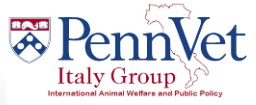Hello!
As I’m writing this I can’t believe its already our last day in Europe! After being greeted by our furry friend at our bed and breakfast, we headed out on our walk to IZSAM. For our final section of the study tour we discussed food safety, hygiene and security and the role of the veterinarians in Europe. When discussing the future of food security with Dr. Francesco Pomilio, we came to the conclusion that education of young consumers will be most important. The primary goal should be to educate about the reduction of food waste. At this time, it is estimated that 2/3 of food is wasted along the production chain! If we hope to sustainably feed the population in the future, one the of the key factors will be reducing this amount of waste. He also made the interesting point that the more developed a country is, the more food it wastes.

Next we discussed IZSAM’s role in food hygiene as a national reference laboratory for many food-borne diseases such as Listeria monocytogenes, campylobacter and brucellosis. Listeria is especially of concern because of the high mortality rate associated with the infection, so much so that the United States has a zero tolerance policy for any Listeria to be on their foods. The EU, however, is a little less stringent with this and allows up to 100 colony forming units (viable bacteria within the sample) unless the food is for ready to eat purposes or for vulnerable consumers such as babies or people who are already sick. One important aspect we discussed is how complex the food production chain is because of the globalization of the food market, just one chicken Kiev product was found to have ingredients from over 30 countries! This can make it impossible to control food safety in a local fashion, forcing you to consider globalized production and a cooperative global approach to safe products. An important technology that is on the rise, called next generation sequencing (NGS) will play a pivotal role in the future of isolating food-borne outbreak infection strains and to help localize where they originated from.
After discussing the importance of the veterinarian’s role in food safety, we got to see it in action at the food processing laboratory present on the campus. Equipped with many bioBUBBLEs the facility is able to work with pathogens and simulate the contamination of different foods throughout their various stages of processing. An interesting machine they were using was an ultrasound cheese cutter that could break the cheese without contaminating the center. This is important in cheeses such as gorgonzola, where Listeria is often found in the rind only, but the center gets contaminated when cutting through it with a knife. We then walked across the street to visit the different labs where food testing and research are performed. Multiple labs utilize PFGE (pulsed-field gel electrophoresis) that basically produces a DNA fingerprint of an isolated bacteria that they can compare to different isolates from different regions in Italy. This can aid in tracing back where a food outbreak originated from. We also got to visit the library within the institute that seemed to have vast resources for the researchers and a great staff of kind and helpful librarians.
After lunch we discussed that within IZSAM there is an International Center for Veterinary Training and Information (CIFIV) that organizes various trainings to offer to the community. Recently they had a great initiative to offer e-learning courses to increase their amount of outreach and in just two years had 17,848 participants from over 82 countries! To end the day we had a very interesting discussion on the roles of veterinarians in Europe and the public’s perception of those roles (with a guest lecturer- a cute dog!). As we discussed the many assignments given to each student, such as lab animals, food safety, public health and companion animals, we often came to the conclusion that the public perception of the veterinary role is not recognized. This lead us into the discussion that there seems to be a lack of leadership within our profession and that we need to make it clear how important of a role we play in many different industries.
Throughout our week in Teramo we learned so much and had so many enthusiastic instructors from the institute. We cannot thank them enough for all the work they put into hosting us this week, along with the many field trip locations that also graciously hosted us! Thank you all again for a wonderful time!
-Carleigh






